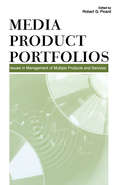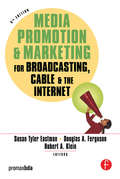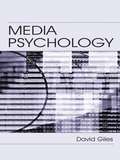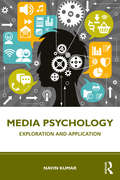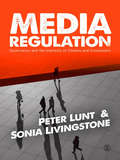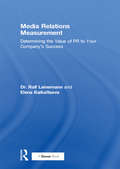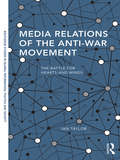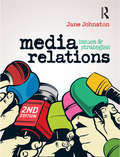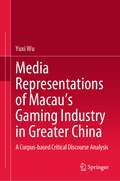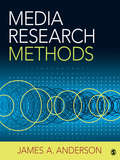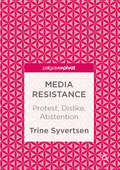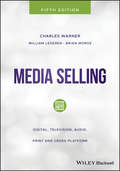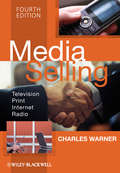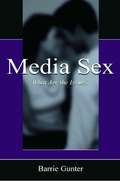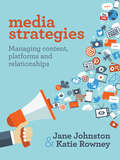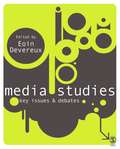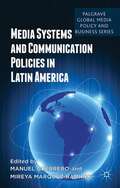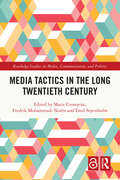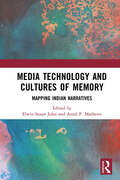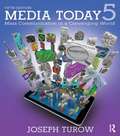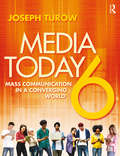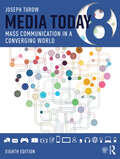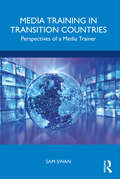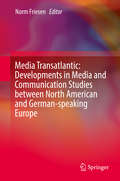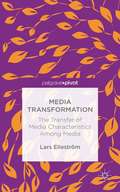- Table View
- List View
Media Product Portfolios: Issues in Management of Multiple Products and Services
by Robert G. PicardMedia product portfolios are rapidly becoming the predominant shared characteristic of media companies worldwide. The phenomenon involves firms from all kinds of media--newspapers, magazines, television, radio, cinema--and is found in enterprises ranging from small, local firms to large, globalized companies. This volume is the result of a coordinated effort of scholars in the United States and Europe to explore the characteristics, processes, challenges, and implications of media product portfolios.This book breaks new ground by introducing the concepts of product portfolio management and applying them to media companies in a comprehensive manner. It draws from knowledge and methods of analyzing product portfolio management in other industries, applies that knowledge to media industries, and analyzes current practices in media firms. The process and issues of portfolio strategy, development, and management are complex and wide ranging. The book explores the development of media product portfolios from an interdisciplinary perspective, providing insight from business, economic, organizational, and communication approaches. The book explores why and how firms develop portfolios, how company strategy and organizational development relate to portfolios, the role of leaders in developing portfolio activities, economic and economic geography issues in portfolios, production issues, challenges in managing multiple products and operations, issues of marketing and branding issues in portfolios, personnel implications, and the unique challenges in the internationalization of media portfolio operations.
Media Promotion & Marketing for Broadcasting, Cable & the Internet
by Robert Klein Douglas A. Ferguson Susan Tyler EastmanThis fifth edition of the successful Promotion and Marketing for Broadcasting, Cable, and the Web, 4ed takes an important, timely look at the newest media venue, the Internet. Under its new title, Media Promotion and Marketing for Broadcast, Cable and the Internet, 5ed it takes a fresh look at the industry and the latest strategies for media promotion and marketing.The book explores the scope and goals of media production from the perspectives of network and local television, cable, Internet and radio, including public broadcasting. Topics include: goals of promotion; research in promotion; on-air, print, and Web message design; radio promotion; television network and station promotion and new campaigns; non-commercial radio and television promotion; cable marketing and promotion; research and budgeting for promotion; syndicated program marketing; global and international promotion and marketing; and online marketing and promotion.
Media Psychology
by David GilesMedia Psychology examines the impact that 21st century media use has on human behavior, from teenage crushes on pop stars to soap fandom in adulthood. It brings together North American communication research with European media research in a variety of disciplines--psychology, sociology, communication and media studies--and in doing so, maps out the territory for media psychology. David Giles argues that psychologists have been guilty of ignoring the influence of the media over the last century, seeing it at best as a minor nuisance that will eventually go away. However, with the increasing prevalence of new electronic forms of mass communication, the media seem to have a greater influence than ever over our daily lives. In this book, Dr. Giles tackles the traditional topics of media psychology--sex, violence, advertising--along with sections on developmental aspects of media influence and the psychology of the audience. He also examines a number of specific media genres--news, sports, soaps, and the increasingly popular audience participation media, such as "reality" and "lifestyle" television. In addition, he asks what light psychology can shed on the popularity of these genres and the response of their audiences. Finally, there are chapters on the increasing influence of the Internet and on the representation of psychology and psychologists themselves in the media.
Media Psychology: Exploration and Application
by Navin KumarThis book examines media psychology as a field of study and provides a fundamental understanding of its emergence and application. It covers various key themes such as consumer behavior, mass media and advertising, media and culture, media messages and their effects on individual and group behavior in the Indian context. It highlights the role of media psychology with reference to citizenship and pedagogy and studies the emerging concept of digital altruism. The author also discusses various research methods used in this field that help to objectively evaluate the impact of mass media messages on people and people’s effect on the functioning of mass media. This comprehensive book will be useful to students and researchers of psychology, media psychology, mass-communication, consumer behavior, digital marketing, corporate communication, and media studies.
Media Regulation: Governance and the Interests of Citizens and Consumers
by Sonia Livingstone Peter LuntIn Media Regulation, two leading scholars of the media examine the challenges of regulation in the global mediated sphere. This book explores the way that regulation affects the relations between government, the media and communications market, civil society, citizens and consumers. Drawing on theories of governance and the public sphere, the book critically analyzes issues at the heart of today's media, from the saturation of advertising to burdens on individuals to control their own media literacy. Lunt and Livingstone incisively lay bare shifts in governance and the new role of the public sphere which implicate self-regulation, the public interest, the role of civil society and the changing risks and opportunities for citizens and consumers. It is essential reading to understand the forces that are reshaping the media landscape.
Media Relations Measurement: Determining the Value of PR to Your Company's Success
by Ralf Leinemann Elena BaikaltsevaNowadays most managers seek a complete picture when it comes to return on investment and this applies to PR too. Despite this, and the developments in measurement tools for marketing and advertising, PR has lagged behind and different professionals have favoured different models. Ralf Leinemann and Elena Baikaltseva's book brings together the range of models for evaluating PR effectiveness and develops them into a series of appropriate tools for business use. Basic concepts such as balanced scorecards, business fundamentals and planning processes are all covered. The authors also introduce their own theory of PR evaluation and apply it to five different types of activity: interviews, press conferences, generic campaigns, crisis PR and long-term projects. In addition, the book contains many valuable tips and real-life examples throughout. Written for corporate PR practitioners and marketing/communications specialists, this book brings together business objectives and the evaluation of company impact in terms of media, reputation, visibility of the company and its competitors. In total, more than 60 different methods of evaluation are discussed, providing readers with an indispensable toolkit for mapping each PR task or project by selecting the appropriate method from the menu provided.
Media Relations of the Anti-War Movement: The Battle for Hearts and Minds (Routledge Studies in Global Information, Politics and Society)
by Ian TaylorIn this book, Ian Taylor examines how a social movement, the anti-Iraq War movement in the UK, engaged with the media as a part of their campaigning against the invasion and occupation of Iraq. Moving beyond content analysis to draw upon interviews with locally based journalists and activists, Taylor examines how locally based anti-war groups engaged with their local press, as well as how those groups were reported on by the local press in their respective areas. In the process of exploring these ideas, the book takes on questions like: How did local journalists assess the legitimacy of the anti-war movement? How, why, and to what extent did opponents of the war pursue local press coverage? What bearing did the social composition of the movement have on the way they set about engaging with the media? How did the local press handle the controversy surrounding opposition to military action against Iraq? Media Relations of the Anti-War Movement makes a unique contribution to research on the interactions between social movements and the media and plugs a major gap in the literature on the Iraq War and the media.
Media Relations: Issues and strategies
by Jane JohnstonPublic relations and the media are in a time of major change. The rise of social media, altered media platforms, evolving legislative environments and new models of communication have altered not only the working environments of public relations and the news and entertainment media, but also many aspects of how these industries work together.Media Relations provides a practical and thorough introduction to media work in this changing environment. Based on a solid understanding of media culture and theory, Jane Johnston shows how to steer a path between the technical and human elements of media relations. She drills down into the different types of media, analysing their applications, strengths and weaknesses, and shows how to target your message to the right media outlets, whether national television, community radio, celebrity magazines or influential blogs.This second edition has been revised throughout and includes new case studies, and new chapters on digital and social media, media campaigns, and legal and ethical considerations.'Media Relations: Issues and Strategies is written in an engaging, easy to understand style. It provides excellent examples and cases of media relations.' - Global Media Journal
Media Representations of Macau’s Gaming Industry in Greater China: A Corpus-based Critical Discourse Analysis
by Yuxi WuThis book is the first linguistic study that combines CL and CDA to compare the media representations of Macau’s gaming industry in English-language newspapers published in Mainland China, Hong Kong, and Macau. An analytical framework based on the notion of the extended units of meaning of a lexical item (Sinclair, 2004) is adopted to examine the ideological stances regarding Macau’s gaming industry among three English-language newspapers published in the three Chinese territories mentioned above by comparing the patterns of co-selection of shared and unique words and phraseologies. The book’s findings confirm that the news media in these three territories differ in their ideological stances. Moreover, the book offers readers a fresh perspective on Macau by exploring how the region and its gaming industry are represented in three news article corpora. Thus, it provides unique insights into the similarities and differences among these three territories. Further, the research suggests that the methods adopted in this book can be replicated to examine and compare the news and political discourses in a variety of contexts. Accordingly, the book represents a valuable resource not only for students majoring in linguistics, media studies, communication, journalism, etc., but also for researchers in the fields of corpus linguistics, critical discourse analysis, etc.
Media Research Methods: Understanding Metric and Interpretive Approaches
by James A. AndersonMedia Research Methods: Understanding Metric and Interpretive Approaches brings the insights of a senior theorist, methodologist, and critic to the classroom. Departing from the methods recipe approach, the text explains the reasons behind the methods and makes the connections to theory and knowledge production. Written in a conversational style, the book engages students and appeals to them as media consumers and users of research. The book takes the reader through each step of the research process, outlining the procedures, differences, strengths and limitations of metric, interpretive and the newer hybrid approaches. The text lays down a strong foundation in empirical research and problem solving, addressing metric topics of hypotheses, sampling, statistics, survey and experimental protocols and interpretive topics of textual analysis, coding, critical engagement and ethnography. A special chapter at the end of the book is a helpful guide for those readers who aspire to a research and analysis career.
Media Resistance
by Trine SyvertsenThis book is open access under a CC BY license. New media divide opinion; many are fascinated while others are disgusted. This book is about those who dislike, protest, and try to abstain from media, both new and old. It explains why media resistance persists and answers two questions: What is at stake for resisters and how does media resistance inspire organized action? Despite the interest in media scepticism and dislike, there seems to be no book on the market discussing media resistance as a phenomenon in its own right. This book explores resistance across media, historical periods and national borders, from early mass media to current digital media. Drawing on cases and examples from the US, Britain, Scandinavia and other countries, media resistance is discussed as a diverse phenomenon encompassing political, professional, networked and individual arguments and actions. di
Media Selling: Digital, Television, Audio, Print and Cross-Platform (Wiley Desktop Editions Ser.)
by Charles Warner William Lederer Brian MorozThe must-have resource for media selling in today’s technology-driven environment The revised and updated fifth edition of Media Selling is an essential guide to our technology-driven, programmatic, micro-targeted, mobile, multi-channel media ecosystem. Today, digital advertising has surpassed television as the number-one ad investment platform, and Google and Facebook dominate the digital advertising marketplace. The authors highlight the new sales processes and approaches that will give media salespeople a leg up on the competition in our post-Internet media era. The book explores the automated programmatic buying and selling of digital ad inventory that is disrupting both media buyers and media salespeople. In addition to information on disruptive technologies in media sales, the book explores sales ethics, communication theory and listening, emotional intelligence, creating value, the principles of persuasion, sales stage management guides, and sample in-person, phone, and email sales scripts. Media Selling offers media sellers a customer-first and problem-solving sales approach. The updated fifth edition: Contains insight from digital experts into how 82.5% of digital ad inventory is bought and sold programmatically Reveals how to conduct research on Google Analytics Identifies how media salespeople can offer cross-platform and multi-channel solutions to prospects’ advertising and marketing challenge Includes insights into selling and distribution of podcasts Includes links to downloadable case studies, presentations, and planners on the Media Selling website Includes an extensive Glossary of Digital Advertising terms Written for students in communications, radio-TV, and mass communication, Media Selling is the classic work in the field. The updated edition provides an indispensable tool for learning, training, and mastering sales techniques for digital media.
Media Selling: Television, Print, Internet, Radio
by Charles WarnerThis newly revised and updated edition of Media Selling addresses the significant changes that have taken place in media industries over the last few years, while continuing as a seminal resource for information on media sales. A classic in this field, this book has long served students and professionals in broadcasting and media industries as an indispensable tool for learning, training, and mastering sales techniques for electronic media Addresses the unprecedented consolidation and sweeping change faced by media industries in recent years, and now features greatly expanded coverage of the Internet, including video streaming and the impact of social network sites Covers a broad span of media industries and issues, including: electronic media, newspapers, magazines, outdoor/billboard promotion, sales ethics, emotional intelligence, and interactive media selling Fully updated to include much greater focus on national and international media sales issues, as well as expanded coverage of network-level selling, product placement, sales promotion use of market data
Media Sex: What Are the Issues? (Routledge Communication Series)
by Barrie GunterThis book examines the representation, impact, and issues relating to the control and regulation of sex in the media. It covers work that has been conducted around the world on the depiction of sex in the mainstream mass media, especially the audio-visual media of film, television, and video, and the alleged effects that such content may have upon media consumers. In addition to reviewing the research on the effects of media sex, the book also examines what is known about public opinion concerning sex in the media. A key theme running through the book is whether the evidence about media sex can be taken at face value. Are the methodologies used by researchers to investigate media sex problematic? Have they yielded data that can be questioned in terms of validity and reliability? Media Sex questions whether media sex poses a serious problem for most viewers of mainstream media. It acknowledges that there may be serious issues relating to the causation of public offense and the cultivation of anti-women attitudes and beliefs that need to be addressed in productions where more extreme forms of sexual conduct are combined with violent and sadistic behavior. With the unrelenting growth of media, media consumers demand and are given greater personal control over the reception of media content. The notion of freedom of speech conflicts with the view that media content needs to be centrally regulated and controlled. This conflict creates problems for regulatory organizations and the legislators in nation states in which freedom of the press is legally protected. The book examines the debate surrounding this conflict.
Media Strategies: Managing content, platforms and relationships
by Jane Johnston Katie RowneyMedia Strategies maps the complex and disruptive media environment for the communication professional and provides the tools and methods to work effectively within it. Increasingly, communication professionals need to be accomplished content managers, capable of employing an arsenal of multi-media tactics across different platforms. This book presents new and innovative approaches to media relations, brand journalism and content management, providing practitioners with the tools to creatively develop, share and deliver strategic media assets and ideas that cut through the cluttered digital environment. The authors also demonstrate that personal and traditional skills are as important as ever, including the ability to tell stories, create memorable media pitches, write and lay-out media materials, and develop credibility and trust in relationships. Media Strategies sets a new agenda for anyone seeking to build a career as a professional communicator. It includes examples from around the world, from corporate, political, government, not-for-profit and activist communication and public relations practice.'The game has changed. Communications professionals should look to this as their guide when navigating a swiftly changing media landscape.' Ross Healy, Brand Social Media Specialist 'Media Strategies cuts through the hype to show how you can build your skills and excel as a communicator in both traditional media and the disruptive digital media platforms.' Elissa Trezia, Financial Technology PR Executive, Indonesia 'An excellent guide to the complex media landscape.' Catherine Archer, Academic Chair, Strategic Communication, Murdoch University
Media Studies: Key Issues and Debates
by Eoin DevereuxBringing together a range of renowned scholars in the field, this book examines eighteen key issues within contemporary media studies. Written in an accessible student-friendly style, Media Studies - Key Issues and Debates is an authoritative landmark text for undergraduate students. Each individual chapter begins with a concise definition of the concept(s) under investigation. This is followed by a 5,000 word discussion on the current state of play within research on the specific area. Chapters contain case-studies and illustrative materials from Europe, North America, Australasia and beyond. Each chapter concludes with annotated notes, which guide the student-reader in terms of future study. With a preface by Denis McQuail, contributors include Janet McCabe, John Corner, David Croteau, William Hoynes, Natalie Fenton, Jenny Kitzinger, Jeroen de Kloet, Liesbet van Zoonen, Sonia Livingstone and Greg Philo.
Media Systems And Communication Policies In Latin America
by Manuel Alejandro Guerrero Mireya Márquez-RamírezMedia Systems and Communication Policies in Latin America proposes, tests and analyses the liberal captured model. It explores to what extent to which globalisation, marketization, commercialism, regional bodies and the nation State redefine the media's role in Latin American societies.
Media Tactics in the Long Twentieth Century (Routledge Studies in Media, Communication, and Politics)
by Marie Cronqvist Emil Stjernholm Fredrik Mohammadi NorénIntegrating media studies with history, Media Tactics in the Long Twentieth Century explores the dynamic relationship between tactics and strategies in recent history.Drawing on examples from a range of different countries and world regions, and looking at the infrastructures, entanglements, and institutions involved, the volume makes a strong case for media tactics as a new field of scholarly inquiry and for the importance of a historically informed approach. In contrast to strategic communication approaches, this media historical intervention contributes to new knowledge about the practical implementation of strategies. First foregrounding tactics as an object of study, the volume then counters the presentism of contemporary studies by adding a necessary historical perspective. Moreover, the book theoretically disentangles the concept of strategy – from an abstract contemporary buzzword to concrete, hands-on actions – which in turn reveals the complexity of using media strategies and media tactics in reality.This volume will interest scholars and students working in the field of media and communication in general, and in the subfields of strategic communication, public relations, media history, and propaganda studies.The Open Access version of this book, available at http://www.taylorfrancis.com, has been made available under a Creative Commons [Attribution-Non Commercial-No Derivatives (CC-BY-NC-ND)] 4.0 license.
Media Technology and Cultures of Memory: Mapping Indian Narratives
by Elwin Susan John Amal P. MathewsMedia Technology and Cultures of Memory studies narrative memories in India through oral, chirographic and digital cultures. It examines oral cultures of memory culled from diverse geographical and cultural landscapes of India and throws light on multiple aspects of remembering and registering the varied cultural tapestry of the country. The book also explores themes such as oral culture and memory markers; memory and its paratextual services; embodied memory practices in the cultural traditions; between myths and monuments; literary and lived experiences; print culture and memory markers; marginalized memories in hagiographies; displaying memories online; childhood trauma, memory and flashbacks; and the politics of remembering and forgetting. Rich in case studies from across India, this interdisciplinary book is a must-read for scholars and researchers of cultural studies, sociology, political science, English literature, South Asian studies, social anthropology, social history, and post-colonial studies.
Media Today
by Joseph Turow"Turow's Media Today: Mass Communication in a Converging World, now in its fifth edition, chooses [a] cutting-edge option. This is a student-friendly publication, offering aids such as definitions of key terms, colourful infographics, case studies and end-of-chapter review questions. There's a companion website, too, and a password-protected website for instructors."--Philip Kemp, Times Higher Education Media Today uses convergence as a lens that puts students at the center of the profound changes in the 21st century media world. Through the convergence lens they learn to think critically about the role of media today and what these changes mean for their lives presently and in the future. The book's media systems approach helps students to look carefully at how media is created, distributed, and exhibited in the new world that the digital revolution has created. In this way, Media Today goes beyond the traditional mass communication textbook's focus on consuming media, to give students an insider's perspective on how media businesses operate. How exactly does Google profit from web searches? What will a magazine look like five years from now? Informative and engaging, Media Today, Fifth Edition, is characterized by its focus on: Convergence: In addition to separate chapters on the Internet and the Video Games industry, coverage of convergence and its impact is incorporated into every chapter. Consumer Education: Media Literacy questions ask students to consider their roles as a media consumer and potential media creator. Comprehensive Media Industry Coverage: Historical timelines in the print book and on the companion website track the development of each media industry, giving students an overview of a particular industry at a glance. Contemporary, Student-friendly Examples: New culture and media boxes help students think about the impact of media industries on their own lives and globally. Joseph Turow--who has been teaching Intro to Mass Communication for well over a decade--demonstrates the many ways that media convergence and the pervasiveness of the Internet have blurred distinctions between and among various media. From newspapers to video games or social networking to mobile platforms, Media Today prepares students to live in the digital world of media.
Media Today: Mass Communication in a Converging World
by Joseph TurowMedia Today uses convergence as a lens that puts students at the center of the profound changes in the 21st century media world. Through the convergence lens they learn to think critically about the role of media today and what these changes mean for their lives presently and in the future. The book’s media systems approach helps students to look carefully at how media content is created, distributed, and exhibited in the new world that the digital revolution has created. From newspapers to video games and social networking to mobile platforms, Media Today prepares students to live in the digital world of media.
Media Today: Mass Communication in a Converging World
by Joseph TurowThis eighth edition of Joseph Turow’s pathbreaking media textbook uses convergence as a lens that puts students at the center of the profound changes in the 21st century media world. It teaches students to think critically about the role of media, and what these changes mean for their lives. The book’s media systems approach helps students to look carefully at how media content is created, distributed, and exhibited in the new world that the digital revolution has created. From news media to video games and social networking to mobile platforms, it provides students with the tools they need to understand and critique the media they encounter and consume. The first part examines the media world as a whole, while the second delves deep into key media industries, such as the movie, television, and video game industries. This new edition includes critical expanded coverage of social media, new forms of both audio and audiovisual media and international case studies, as well as updated figures, tables, and pedagogy, including key terms and further activities. Media Today is an excellent introduction to the world of media in the digital age, perfect for students seeking a solid grounding in media studies. Extensive pedagogical materials also make this a highly teachable book, well suited to the classroom. The accompanying website has also been updated with new student and instructor resources, including chapter recaps, recommended readings, and instructor’s manual.
Media Training in Transition Countries: Perspectives of a Media Trainer
by Sam SwanThis book explores the impact of, and lessons learned from, media development and training programs sponsored by the US government and non-governmental organizations in countries transitioning to democracy. Recognizing the importance of establishing a free press and a free market economy in newly democratic societies, this book examines the training of journalists and media managers in selected countries in Eastern Europe, Africa, Asia, the Middle East, and South America. Drawing on the author’s and other media trainers’ experiences over a 25-year period, this book provides important insights into tailoring training programs to specific regions and countries. Case studies describe training in radio and television management, broadcasting, and media sustainability, and are contextualized against the cultural and historical backgrounds of each region. Media Training in Transition Countries will be of interest to media trainers, government and nongovernment agencies, and scholars and students of international journalism and development.
Media Transatlantic: Developments in Media and Communication Studies between North American and German-speaking Europe
by Norm FriesenThis book reflects recent scholarly and theoretical developments in media studies, or Medienwissenschaft. It focuses on linkages between North America and Germanâe speaking Europe, and brings together and contextualizes contributions from a range of leading scholars. In addition to introducing Englishâe language readers to some of the most prominent contemporary German media theorists and philosophers, including Claus Pias, Sybille Krämer and Rainer Leschke, the book shows how foundational North American contributions are themselves inspired and informed by continental sources. This book takes Harold Innis or Marshall McLuhan (and other members of the "Toronto School") as central points of reference, and traces prospective and retrospective lines of influence in a cultural geography that is increasingly global in its scope. In so doing, the book also represents a new episode in the international reception and reinterpretation of the work of Innis and McLuhan, the two founders of the theory and study of media.
Media Transformation: The Transfer of Media Characteristics Among Media (Palgrave Pivot)
by Lars ElleströmThis is a methodical study of the material, mental limit and possibilities of transferring information and media characteristics among dissimilar media. Ellestrom proposes a model for pinpointing the most vital conceptual entities and stages in intermedial transfers with different media that have common traits that enable systematic comparison.
